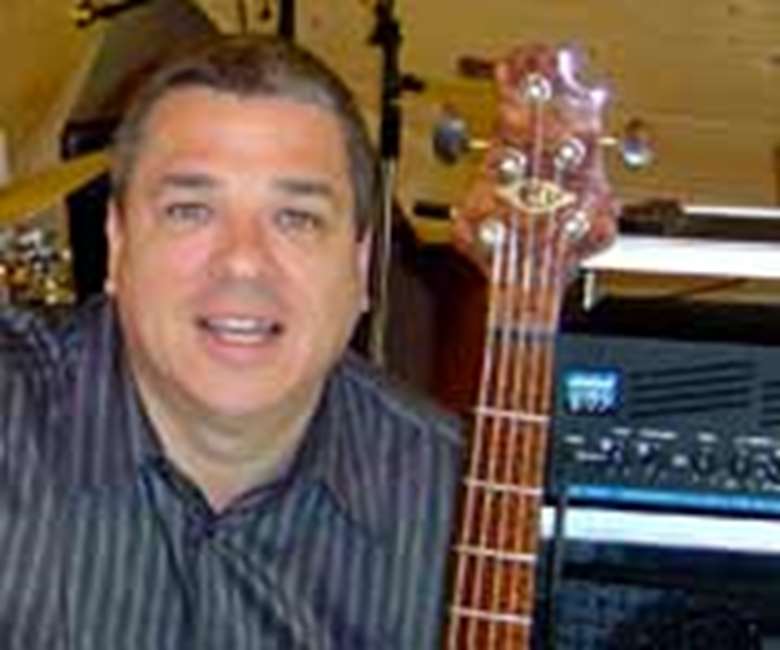Laurence Cottle - Bass Guitar
Tuesday, March 20, 2007
David Gallant talks to the bassist and bandleader about how he got started, the instruments he has played over the years and his all time favourite choice. Cottle’s first performance was hardly an auspicious beginning to a successful musical career. “I was about two years old,” he remembers, “when I appeared out of a suitcase as my father’s ventriloquist dummy!”

Born in Swansea, into a musical and theatrical family, Cottle was one of three brothers who helped their father (a pianist) in his variety act. “We were all encouraged to play the piano,” he continues, “and also to take up a second musical instrument.” Cottle chose the trombone, while the eldest brother took up the trumpet and the middle brother the clarinet. With little music in school, he remembers going to a private trombone teacher, “where I did all the grades.” At the same time, his father realised that his growing family had the necessary instrumentation to set up a trad jazz band, and so throughout his early teens Cottle toured Wales and the West Midlands, gaining valuable “playing” experience.
“When I was 16,” says Cottle, “my father decided that he wanted to switch the band to being a dance band rather than a ‘trad’ band, and that’s when I first picked up the bass.” His first bass was a Kay that he put through an old Selmer valve amp. “I soon got tired of that,” he comments, “so I bought a Fender Jazz that I fed through an Ancron unit. That was a lovely instrument – I played that for a long time.” Surprisingly, Cottle never had any formal lessons on the bass guitar and eventually moved up to London in the late 70s to see if he could hack it with the best of them. “I was lucky, because my saxophonist brother Richard was living in London, and he had just completed a world tour with Stevie Wonder, apart from doing some work with Mick Jagger and David Bowie.”
The younger Cottle started off by working in a music shop and began to meet fellow musicians who would drop by to pick up the latest sounds. “I got to meet Mike Mower, and joined his band Itchy Fingers. Then he formed Hiatus and we won a jazz award in 1986, which was followed by a record deal.” This relationship however, was relatively short lived and Cottle was soon providing the bass figures for Jim Mullen’s quartet. “I learnt a heck of a lot from Jim,” remembers Cottle. “It was a great learning experience.” The association lasted for eight years and produced three albums. During this period, Cottle also produced two albums of his own: Five Seasons, and a live album with a quintet.
So what bass did Cottle turn to after the fateful sale of his old Fender Jazz. “I got in touch with Wal basses, and they made me both a four string fretted and a frettless.” He thinks for a moment, then proudly announces. “I’ve actually also got a five string version of both now.” Cottle’s played Wal basses for more than 10years, but he’s recently moved on to a fretted 5 string handmade model made by the British luthier Bernie Goodfellow. “I asked Bernie to make me a bass a little while back,” says Cottle. “He was determined to make a bass that I was really happy to play. So he took the measurements of basses that I really liked and we looked at woods and chose an exotic wood that looked really nice, but that also had really good resonant qualities. The body’s made of swamp ash, with a facing of an African wood called Thuja. The fingerboard is made of snakewood.” Am I hearing this right I wonder! “Oh yeah… it’s very exotic stuff,’ confirms Cottle. “It looks amazing.” He continues. “It’s got a straight through neck made out of flame maple and black American walnut, with the strings running through the body”.
But although Cottle’s current “playing” bass is a Bernie Goodfellow, he also owns a large selection of other instruments that all have a particular purpose. “I’ve always done a lot of session work, so I have a Fender Jazz and a Fender Precision in case someone wants that ‘old’ sound. I also have a very nice Guild and a Martin acoustic bass and a five string fretless Washburn.” We quickly move on to the subject of amplification. “I use EBS amps,” says Cottle. “They’re Swedish. I have the TD650 watt head, with two 12’s and one 10. They give a nice warm sound, while at the same time being very punchy.” So what might that old 60s Fender Jazz sound like through the EBS setup I wondered. “I wish… I wish," says Cottle with a heavy sigh. "I just love those old jazz basses.”